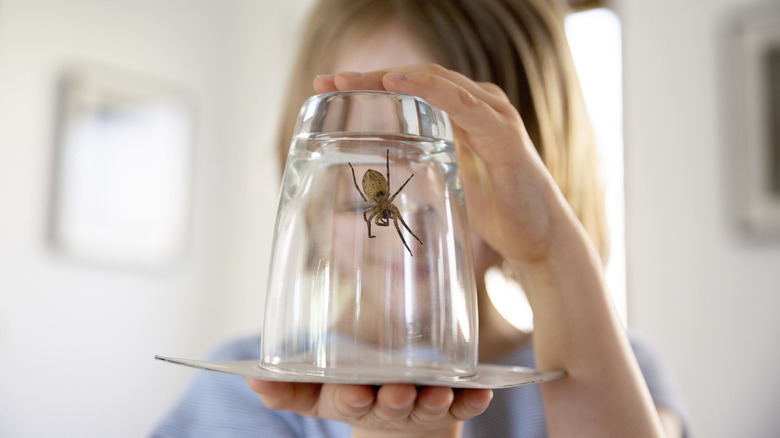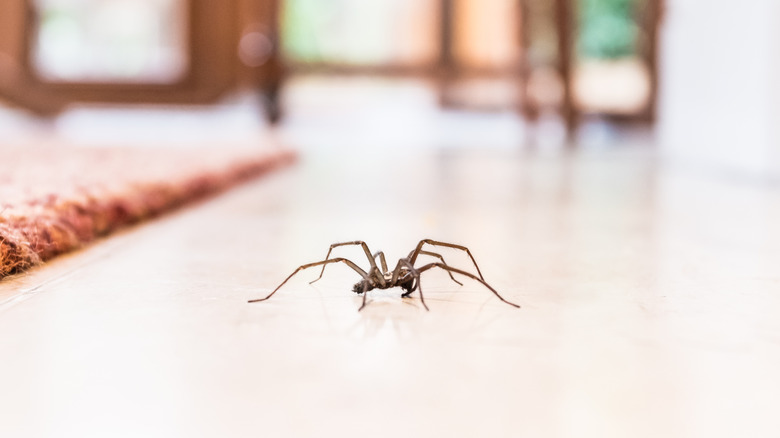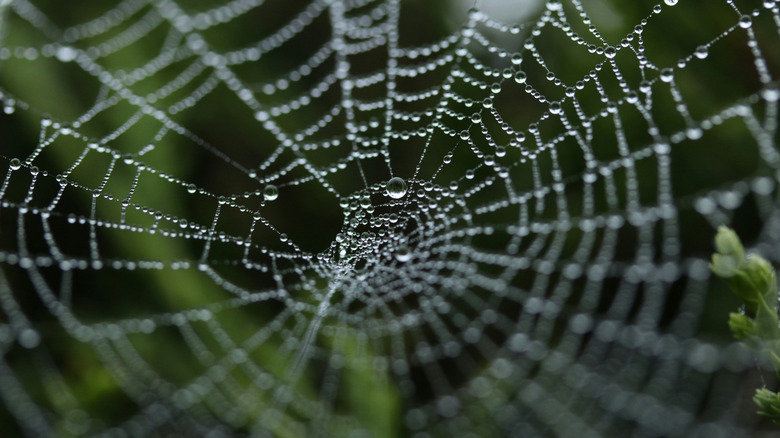There's A Good Reason Why You Shouldn't Kill The Spiders In Your House
For many, spiders are the ultimate uninvited houseguests. Their eight legs, webbed homes, and skittering movements are understandably alien-looking to us, often triggering a mix of fear or revulsion in people (just take a look at this fossilized spider from Australia if you need a reminder). These kinds of feelings can result in a swift swipe of a shoe or an attempt to remove the animal from the premises. But a growing body of research indicates that these misunderstood creatures play an essential role in our homes, and that, perhaps, spiders deserve a bit more respect and even admiration than we generally offer them.
Tempting though it may be to clear out the cobwebs and banish spiders from your home, these small arachnids are quietly working as natural pest controllers. Feasting on a variety of insects — from flies to mosquitoes and even roaches — spiders help keep critter populations low and out of sight. Beyond being convenient exterminators, they're also fascinating creatures that have coexisted with humans for millennia.
In 2016, a scientific study published in PeerJ shed light on just how beneficial spiders can be in indoor environments. A team of researchers led by diagnostic entomologist Matt Bertone at North Carolina State University's Plant Disease and Insect Clinic explored the types of arthropods (a category of which spiders are card-carrying members) found in 50 homes in North Carolina and the ecological roles they play. The paper's results may alter how you see these leggy housemates.
What science says about spiders in your home
The 2016 study collected over 15 different spider species from the surveyed North Carolina homes. These included cellar spiders and cobweb spiders (yes, cobweb spiders are a thing), which were among the most common indoor inhabitants, along with beetles, ants, and flies.
One of the paper's most compelling findings was that spiders act as natural pest managers. The dark corners of our homes' closets, basements, and garages are far from empty wastelands — they are filled with different kinds of insects going about their lives in a surprisingly rich ecosystem that exists right under our noses. By preying on these insects, including disease-carrying airborne critters like mosquitoes, spiders help maintain a healthier living environment for everyone inside it.
The study also helps dispel some common fears regarding the animals, describing how most "pest" species we find in our homes cause people no harm, being seen as pests simply because they inhabit the same space as us. And while many species of spider are indeed venomous, the amount of venom most carry cannot affect humans in any adverse way — and that's if the spider's fangs even manage to get past our relatively thick layer of skin, another improbability. In any case, they're nothing compared to the venomous creature that's swarming Arizona these days, which isn't even a spider.
Why you should welcome spiders as housemates
Spiders are more than just vital components of a home's micro-ecosystem. Allowing them to coexist in your living space contributes to a natural balance that reduces reliance on chemical pest control methods.
Beyond their practical benefits, it's worth remembering that spiders have evolved alongside humans since our species first emerged on the planet. Rather than seeing them as strangers, letting them have their space in a human-made dwelling presents an opportunity to observe their unique abilities and learn about the natural world. Spiders' web-spinning, hunting, and eating behaviors are a reminder of the complexity of nature's food chain. Viewing them as valuable (or even benevolent) members of the home can help shift a perhaps unnecessarily anxious narrative about them from fear to appreciation.
And just to prove there's nothing disingenuous here, if you really want to see how scary the animal kingdom can be, check out these 12 prehistoric sea animals that are pure nightmare fuel.


